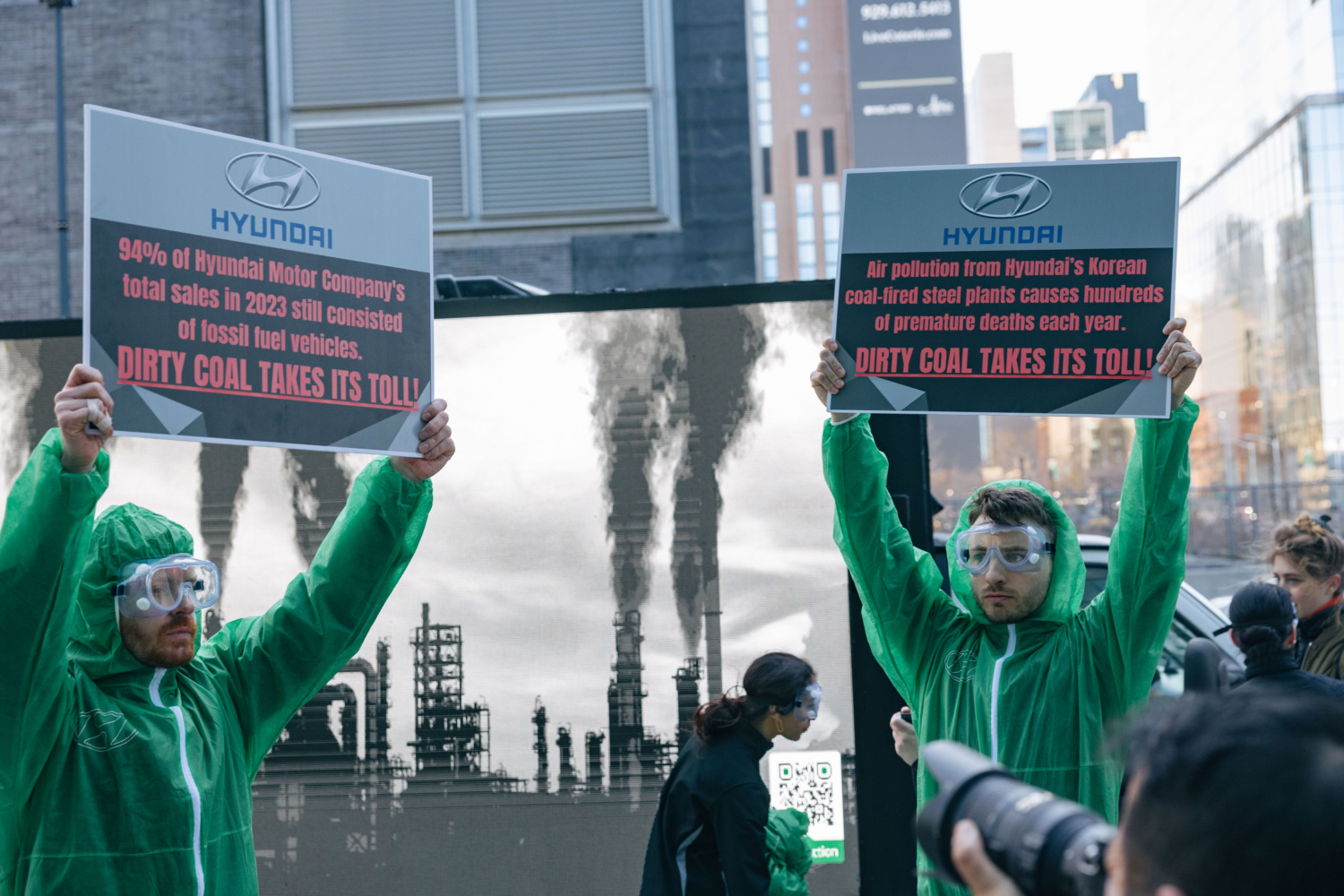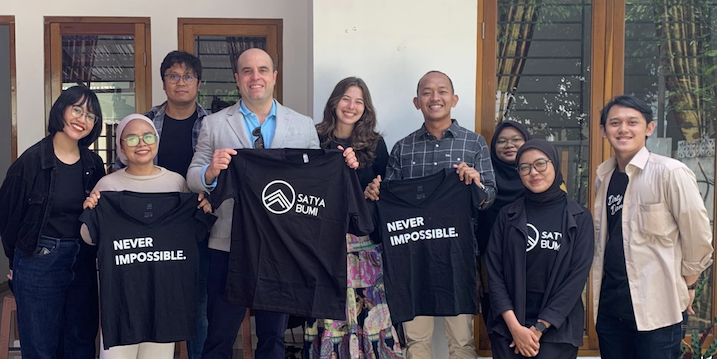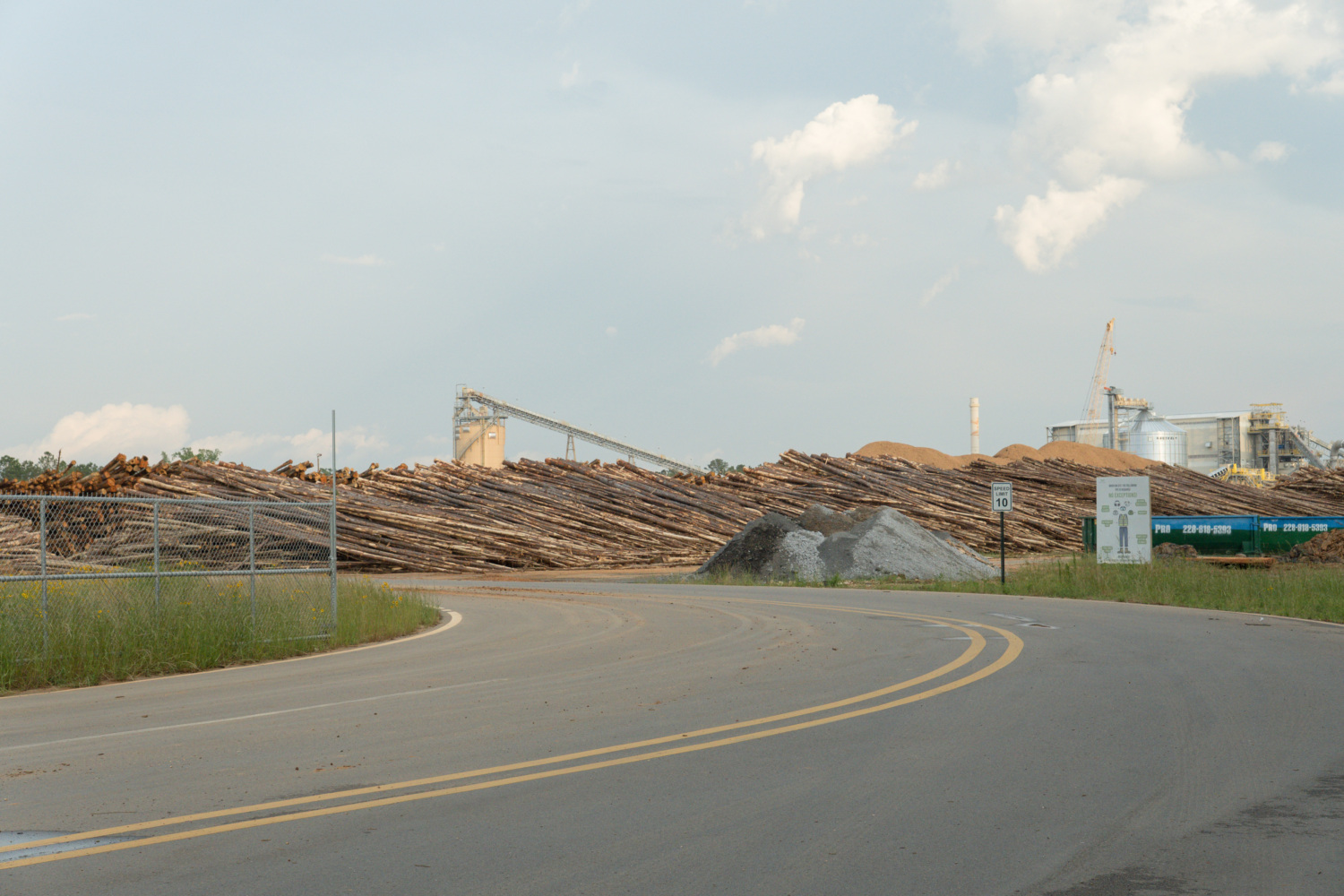
Climate campaigners stage bold action at NY auto show to protest Hyundai’s greenwashing
(New York, New York) – At the New York International Auto Show on Saturday, March 30th 1100 ET, Mighty Earth and The Sunrise Project along with local climate organizers staged an action protesting Hyundai’s use of dirty coal in its supply chain. Despite Hyundai’s claims about using “sustainable materials“, the automaker has made almost no progress on phasing out the coal-based steel and aluminum used in its vehicles. The civil society groups called on the world’s third-largest automaker to completely eliminate coal power from its material supply chain, address human rights abuses in its supply chain. and stop the use of dirty, high-carbon aluminum and steel to make truly clean electric vehicles (EVs).
Matthew Groch, Senior Director for heavy industry decarbonization at Mighty Earth said:
“It’s quite the paradox that Hyundai’s IONIQ 5 clinches the title of World Performance Car while its supply chains are fueled by coal and child labor. Despite portraying itself as a leader in clean EVs, Hyundai’s reliance on dirty energy for materials like steel and aluminum exposes that this couldn’t be farther from the truth.”
Hyundai Motor Group, which includes Hyundai Motor Company and Kia Corporation, has been proclaiming that it is “leading the electric vehicle transition” and is “investing in the future of sustainable mobility” in the U.S. However, 94% Hyundai’s total sales in 2022 still consisted of fossil fuel vehicles. Further, a recent study found that Hyundai Motor Group underreported its total greenhouse gas emissions by 113%, the second largest underreporting of all the automakers evaluated, and that investments in the company are more carbon-intensive than investments in ExxonMobil.
Despite Hyundai Motor Group’s claims that its award-winning EVs focus on using “sustainable materials” and “materials that take care of people”, the company has also come under increasing scrutiny over steel emissions and human rights abuses in its supply chains in Korea and in the U.S. A 2022 study projected air pollution from South Korea’s three coal-fired steel plants, one owned by Hyundai, could cause an estimated 19,400 premature deaths by 2050 unless action is taken. A major steel supplier within the Hyundai group, Hyundai Steel, has also recently been called out by local civil society groups for their investment in an emissions intensive and air polluting LNG power plant for its steelmaking, instead of focusing on renewable energy and green hydrogen. In the US, Hyundai’s suppliers were found to have hired children to make components for its vehicles. In August of 2023, labor groups in Alabama and Georgia spoke out to condemn this and other unacceptable labor practices by Hyundai and its suppliers. The groups called on Hyundai to implement third party monitoring of its suppliers and sign a community benefits agreement with local communities but, to date, these calls have gone unanswered.
At the Los Angeles Auto Show in November, a group of environmental advocates led by Youth Climate Strike LA staged a “die-in” to protest Hyundai’s use of child labor and dirty coal as part of its auto supply chain.
Hyundai and Kia’s performance on equitable and sustainable supply chains were also recently evaluated in the second edition of the Lead the Charge Leaderboard, where both companies performed poorly, ranking 10th and 13th, respectively.
Chris Alford of The Sunrise Project said:
“The Lead the Charge Leaderboard finds that Hyundai and Kia’s pledges to become global leaders in sustainability do not match reality. Neither company improved their performance against any of the indicators on building fossil-free and environmentally sustainable steel and aluminum supply chains, scoring an average of 8% and 2% respectively for their efforts on this. Moreover, Hyundai scored just 18% and Kia only 9% when it came to their performance on ensuring responsible sourcing and respect for human rights across their supply chains. Given the grave allegations against Hyundai’s suppliers in countries such as the United States, this lack of progress is simply unacceptable.”
The unprecedented transition to EVs represents a huge opportunity not only to cut pollution globally but to spur the creation of thousands of family-sustaining auto manufacturing and auto supply chain jobs for workers to build the clean vehicles of the future. However, as the EV transition spreads, by 2040, 60% of embodied emissions from EVs are expected to come from the materials used to build the cars, such as high-carbon materials like steel and aluminum that are made with coal-fired energy. Pollution from these coal-dependent processes is linked to huge quantities of greenhouse emissions, as well as respiratory illnesses, cancer, and premature death for predominantly communities of color on the fence lines of these operations.
===


